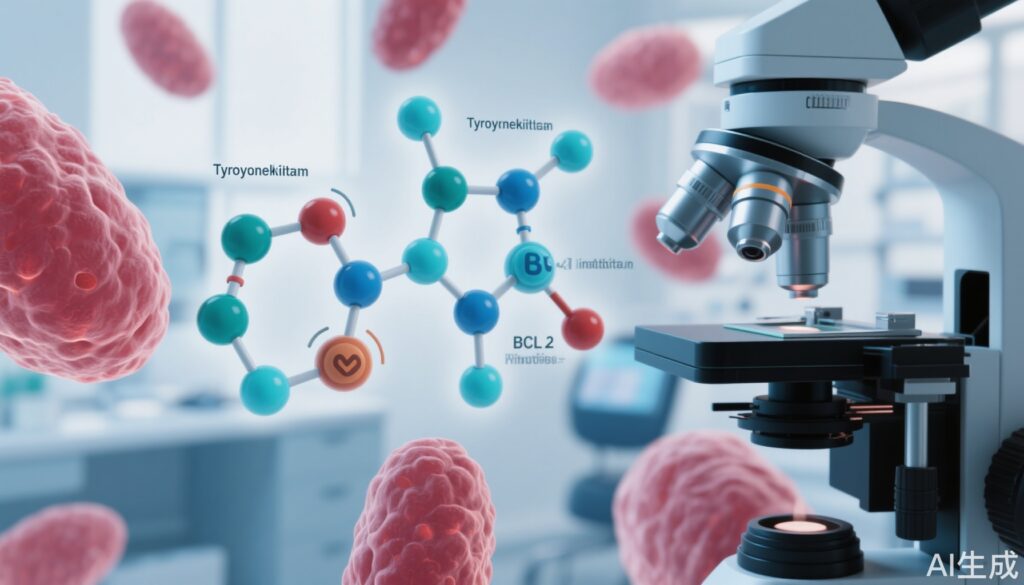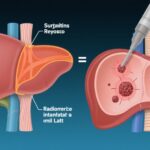Highlights
- Olverembatinib combined with venetoclax and reduced-intensity chemotherapy achieved a 3-month complete molecular response (CMR) rate of 62% in newly diagnosed adult Ph+ ALL patients without intensive chemotherapy or immunotherapy.
- No induction phase deaths occurred, and 1-year overall survival and event-free survival rates were 93.1% and 89.1%, respectively.
- Transcriptomic analysis supports a complementary mechanism between olverembatinib and venetoclax, strengthening the rationale for this combination.
- The regimen offers a viable frontline option for patients ineligible for intensive therapies.
Study Background and Disease Burden
Philadelphia chromosome-positive acute lymphoblastic leukemia (Ph+ ALL) is an aggressive hematologic malignancy defined by the presence of the BCR-ABL1 fusion gene, which confers poor prognosis without targeted therapy. Historically, Ph+ ALL was associated with low remission rates and high relapse risk, particularly in adults. The introduction of tyrosine kinase inhibitors (TKIs), such as imatinib and dasatinib, revolutionized therapy, markedly improving outcomes by directly targeting the BCR-ABL1 oncoprotein. Current standards involve combinations of TKIs with multi-agent chemotherapy and, for some, immunotherapies such as blinatumomab. However, intensive regimens pose significant toxicity and are unsuitable for many older or comorbid patients, underscoring the need for efficacious, less toxic alternatives. The potential synergy of BCL-2 inhibition (via venetoclax) with TKIs represents a promising, yet underexplored, strategy.
Study Design
This was a single-center, open-label, single-arm, phase 2 clinical trial (NCT05594784) conducted from October 2022 to March 2024. Seventy-nine adult patients (median age 42 years) with newly diagnosed Ph+ ALL received a frontline regimen comprising olverembatinib (a third-generation TKI), venetoclax (a selective BCL-2 inhibitor), and reduced-intensity chemotherapy. Patients completed at least three cycles of the combination regimen. The primary endpoint was complete molecular response (CMR) at 3 months. Secondary endpoints included overall survival (OS), event-free survival (EFS), and safety outcomes. Transcriptomic analyses were performed to elucidate mechanistic interactions between the agents.
Key Findings
Efficacy:
The regimen achieved a 3-month CMR rate of 62.0%, a notable result given the omission of intensive chemotherapy or immunotherapy. Achieving CMR is a critical therapeutic milestone in Ph+ ALL, correlating with improved long-term outcomes and reduced risk of relapse.
At a median follow-up of 12 months, estimated 1-year OS and EFS rates were 93.1% (95% CI, 86.4–99.8) and 89.1% (95% CI, 80.3–97.9), respectively. These figures compare favorably to historical controls receiving standard TKI plus intensive chemotherapy, where 1-year OS typically ranges from 70%–90%, albeit with greater toxicity.
Safety:
There were no deaths during the induction phase, indicating that the regimen’s reduced intensity did not compromise safety. Hematologic and non-hematologic adverse events were not detailed in the summary, but the absence of early mortality suggests a manageable safety profile.
Mechanistic Insights:
Transcriptomic analysis revealed that TKIs and venetoclax may act complementarily. TKIs target the BCR-ABL1 fusion protein, a driver of leukemogenesis, while venetoclax induces apoptosis by antagonizing BCL-2, a key survival protein in leukemia cells. Their combined use potentially overcomes resistance pathways and enhances leukemic cell death, providing a biologically plausible rationale for the observed clinical efficacy.
Special Populations:
This regimen is particularly attractive for patients who are unfit or unwilling to undergo intensive chemotherapy or immunotherapy, broadening therapeutic options for a traditionally underserved patient population.
Expert Commentary
The landscape of Ph+ ALL treatment has rapidly evolved. While the addition of immunotherapy (e.g., blinatumomab) to TKI-based regimens has improved outcomes, access and tolerability remain barriers, especially in resource-limited settings and for older adults. The current trial provides important evidence that a potent, chemotherapy-sparing regimen can yield high molecular response and survival rates in a real-world population.
The trial’s single-arm, single-center design limits generalizability, and longer-term follow-up is needed to confirm durability of response and late toxicities. Additionally, the patient cohort’s relatively young median age (42 years) may not fully represent the older ALL demographic most in need of reduced-intensity approaches.
Nonetheless, the trial’s high CMR and OS rates, together with mechanistic validation, offer a compelling case for further multi-center, randomized studies. The complementary action of olverembatinib and venetoclax is mechanistically robust, and future investigations should explore optimal dosing, sequencing, and integration with minimal residual disease (MRD) monitoring.
Conclusion
Olverembatinib in combination with venetoclax and reduced-intensity chemotherapy demonstrates promising efficacy and safety as initial therapy for adults with newly diagnosed Ph+ ALL, especially those ineligible for more aggressive regimens. The trial’s results justify further large-scale, randomized studies and suggest this combination could become an important addition to the therapeutic armamentarium for Ph+ ALL.
References
1. Gong X, Liu W, Liu Y, Fang Q, Gu R, Liu K, Lin D, Zhou C, Zhang G, Gong B, Wei S, Li Y, Li S, Wang Y, Hu Y, Qiu S, Liu B, Wang Y, Mi Y, Wei H, Wang J. Olverembatinib combined with venetoclax and reduced-intensity chemotherapy for adult newly diagnosed Philadelphia chromosome-positive acute lymphoblastic leukemia: a single-center, single-arm, phase 2 trial. Leukemia. 2025 Aug;39(8):1838-1847. doi: 10.1038/s41375-025-02674-8. Epub 2025 Jun 30. PMID: 40588568.
2. Jabbour E, Kantarjian H. Philadelphia chromosome-positive acute lymphoblastic leukemia: current treatment and future directions. Blood. 2020;135(9):694-706. doi:10.1182/blood.2019000931.
3. Short NJ, Jabbour E. Emerging treatment paradigms in Philadelphia chromosome-positive acute lymphoblastic leukemia. Curr Hematol Malig Rep. 2022;17(5):119-128. doi:10.1007/s11899-022-00668-2.
4. ClinicalTrials.gov. NCT05594784. https://clinicaltrials.gov/ct2/show/NCT05594784


